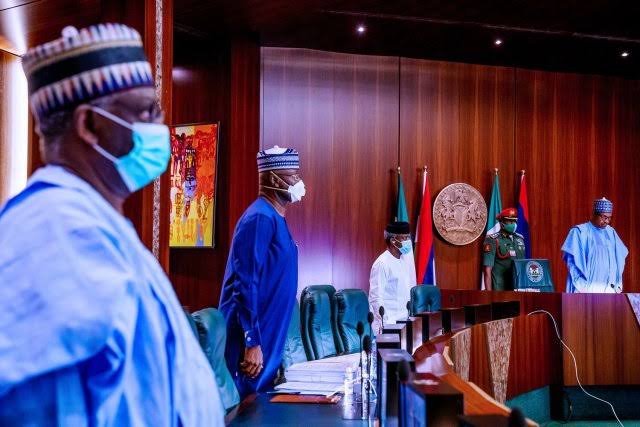COVID-19: FEC Cuts Budget 2020 To N10.523trn
7 min read
THE Federal Executive Council, FEC, yesterday, revised the 2020 Budget from N10. 594 trillion signed into law by President Muhammadu Buhari to N10. 523 trillion.
FEC also approved the amendment of the Medium Term Expenditure Framework, MTEF for 2020-2022.
Recall that the National Assembly had increased the 2020 budget from N10.33 trillion submitted by the executive to N10.594 trillion.
The budget cut, especially the review of oil benchmark to $25 per barrel, drew the attention of experts who advised the federal government to immediately diversify the economy with money realised from sale of the product, to stop depending on oil.
The Minister of Finance, Budget and National Planning, Mrs. Zainab Ahmed, disclosed this while briefing State House correspondents after the virtual FEC meeting presided over by President Muhammadu Buhari at the Council Chamber, Presidential Villa, Abuja.
According to her, Council approved the recommendations with key parameters, including the price of crude oil which was pegged at $25 per barrel, crude oil production at 1.94 million barrels per day and an exchange rate of N360 to $1.
She said the revised budget was now a total sum of N10.523 trillion, a difference of about N71.5 billion when compared to the approved budget.
The minister explained: “This is because, as we cut down the size of the budget, we also have to bring in new expenditure previously not budgeted, to enable us adequately respond to the COVID-19 pandemic.
“The federal government in this budget will have direct revenue of funding the budget of N5.158 billion. The deficit to this budget is N5.365 trillion and this will be financed by both domestic as well as foreign borrowing.
“The foreign borrowing we are doing for 2020 are all concessionary loans from the IMF which have already been approved and have crystallized, from the World Bank, Islamic Development as well as Afro EXIM bank.
“There will also be some drawdown of previously committed loans for major ongoing projects that we will be drawing from both existing facilities as well as some special accounts, with the approval of Mr. President and the National Assembly. And also revenue that we are expecting to realize from privatization.
“So, the borrowing, the multilateral loans drawdown coming from special accounts and coming from the privatization will fund the fiscal deficit of N5.365 trillion that we have in the proposed amendment of the 2020 budget.”
Abakaliki Ring Road project
The Minister disclosed that the request of $80 million loan from the Islamic Development Bank on behalf of the Ebonyi State government was also approved by FEC
Mrs. Ahmed, who noted that the money would be used to finance the construction of the Abakaliki Ring Road project, said: “While the federal government is the one borrowing from the bank, it will be unlending this loans to Ebonyi State government.
“We have done our debts sustainability analysis that proves that Ebonyi State has the capacity to repay this loan which is provided on a basis of Libel plus and also long tenure for repayment.
“This Ebonyi Ring Road connects 13 local governments in the states as well as the neigbouring Cameroon Republic. It is a major road that will provide access to the citizens in the state, to farmers, markets and will enhance economic activities in the state. And the neigbouring states will also benefit from this project.”
She said the Council also approved the purchase of three locally manufactured boats for the Nigeria Customs Service for its surveillance and anti-corruption activities on the maritime waters.
Made in Nigeria goods
She said there was a push to patronize made in Nigeria goods because of the coronavirus pandemic and also boost the economy, adding that the purchase approved for Customs would be done locally.
“On prioritization of made in Nigeria products, as you know, the President has set up an economic stimulus committee, chaired by the Vice President. The work of the committee is to develop 12 months economic stimulus plan and we are at the final stage of that work.
“We have prioritized spending in that plan to use and consume made in Nigeria. For example, some of the public works projects that will employ a lot of our youths is to be done using strictly our raw materials, so we don’t have to import bitumen for example to build our roads.
“Some of the council memos that were taken today have been in council waiting on the queue for a couple of months now. The one for transport is not new, it didn’t just come today and council felt it should go because it’s been there for a long time.
“But we have got approval from Mr. President that spending as much as possible should be made in Nigeria on goods and products that are produced in Nigeria, so that it saves our foreign exchange and also helps to grow the economy.”
Also briefing, the Minister of Agriculture and Rural Development, Alhaji Sabo Nanono, said the Council approved a loan facility of $1.2 billion to finance the mechanisation of agriculture in the country.
Noting that the planned mechanisation of agriculture would span 632 local government areas, the minister said: “Today, we presented a joint memo with the Federal Ministry of Finance in which we sought the approval for a loan facility of about 950 million Euros, translated probably to $1.2 billion.
“This loan is for the purpose of agricultural mechanisation in this country –that will cover about 632 local governments plus 140 processing plants. This is going to be a major revolution in the agriculture sector that we have never seen before.’’
On his part, the Minister of Transportation, Mr Rotimi Amaechi, said council approved a memo for award of contract in the sum N683 million for the purchase of 19 vehicles for Nigeria Ports Authority, NPA.
“This is the first time in four years that NPA is buying any vehicle and that is why the council okayed it.
These are operational vehicles; they are not for management staff; they are all Toyota vehicles,” he said.
On his part, the Minister of Power, Malam Sale Mamman, said the ministry sought approval for the revised estimated total cost for the augmentation of the subsisting contract in the sum N47.2 million.
He said the contract was for the provision of additional critical power grid infrastructure for the full evacuation and utilisation of 40mw currently from Kashimbila via Takum-Wukari and Yendev.
He said: “This is to evacuate completely 40 megawatts to the National Grid. If it is not evacuated, Nigerian government will lose not less than 130 megawatts of power, which is equivalent to almost nine million in a year.’’
In his presentation, the Minister of Information and Culture, Alhaji Lai Mohammed, said the critical power evacuation served not just Taraba and Benue states but the entire North East.
“Power is something that you cannot store and once it is stranded, it poses a lot of risk. It is better for us to get this additional funds, so we can evacuate it and then, of course, 40 megawatts power will do a lot to improve the lives of many Nigerians,” he said.
Experts react
Commenting on downward review of the oil price benchmark to $25 per barrel and of the exchange rate benchmark to N360 per dollar, Ayodeji Ebo, Chief Executive Officer, Afrinvest Securties Limited said: “I think the focus should be how to boost non-oil revenue. Reviewing downwards the benchmark at this point does nothing much to the budget.
‘’The government requires more private sector involvement to execute capital projects as the actual deficit based on past revenue performance will be over N6.0trn. How does the government intend to solve this? A major cut to recurrent expenditure is required to improve the budget performance as well as sale of some portion of government holdings in some companies to raise funds.”
Also reacting last night, the President, Oil and Gas Service Providers Association of Nigeria, Mazi Colman Obasi, said the $25 per barrel budget bench marksaid: “The budget cuts, exchange rate issues and additional borrowing are not unexpected. They are the realities of the day necessitated by the coronavirus pandemic. The entire world is grappling with the same issues.
“However, Nigeria’s case (same with other underdeveloped economies) have been magnified by years of ineptitude, absence of long-term strategic planning, corruption, among others. Unfortunately we are being forced to learn the hard way what we should have learnt long before now.
Now we are realizing that we ought to have diversified our economy. We are realizing that we cannot depend on crude oil for our sustainance. No nation can. We need to diversify our economy away from oil. We need to give credence to other sectors, especially manufacturing.
Fortunately all hope is not lost. If we realize now and really work hard on it, we can overcome. But it’s not going to be easy; in fact it’s going to be tough, very tough and very rough. But Nigerians are very resilient people. If we work on it with the commitment it requires, we could come out stronger.”
In his reaction, Director General, Lagos Chamber of Commerce & Industry, LCCI said: “ All of these are reflections of the gloomy fiscal outlook for the economy resulting from the revenue shocks.
‘’Spending will be considerably constrained and fiscal deficit will escalate. Many capital projects may not be funded. The depreciation in the exchange rate will also take a toll on many sectors. Major adjustments will have to take place in both public and private sectors of the economy.”





